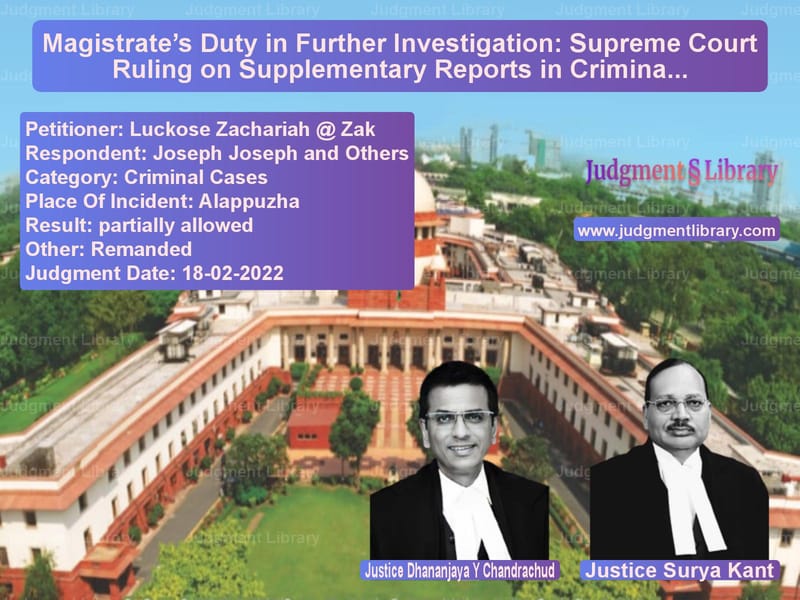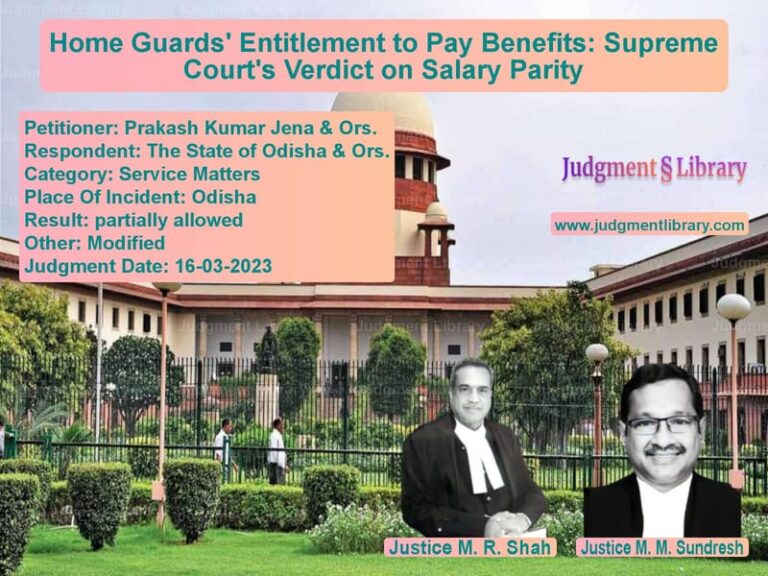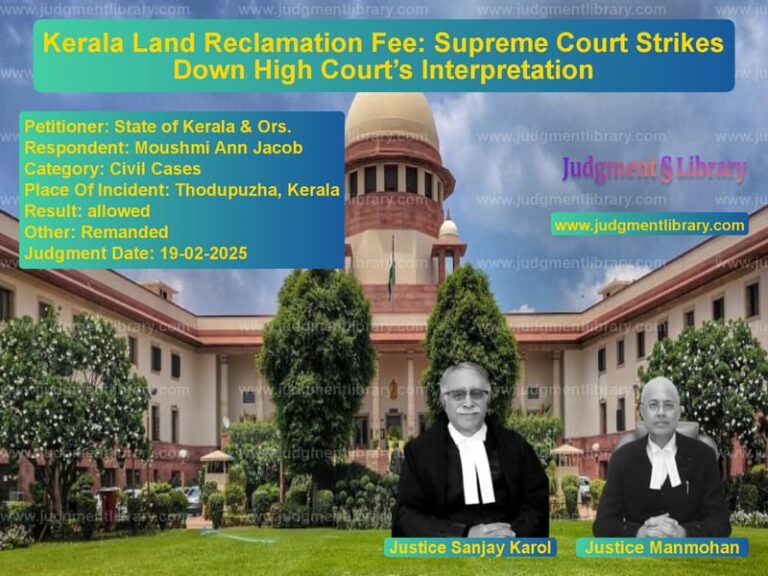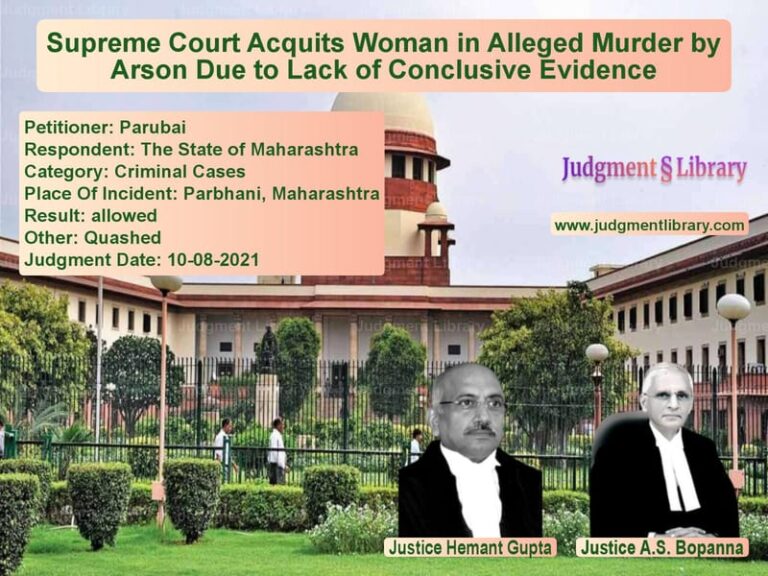Magistrate’s Duty in Further Investigation: Supreme Court Ruling on Supplementary Reports in Criminal Cases
The case of Luckose Zachariah @ Zak vs. Joseph Joseph and Others revolves around the interpretation of procedural rights of the accused and the duty of the Magistrate to consider both primary and supplementary investigation reports before proceeding with a trial. The Supreme Court examined whether the Magistrate could ignore the supplementary report, which concluded there was no prima facie case against the accused, and how such reports should be evaluated in light of judicial precedents.
Background of the Case
The case arose out of a criminal complaint filed by the first respondent, Joseph Joseph, alleging offences under Sections 294(b), 323, and 324 read with Section 34 of the Indian Penal Code (IPC). The appellants, including Luckose Zachariah (the first appellant), were accused of causing bodily harm to the first respondent and using abusive language. An FIR was registered, and the police initiated an investigation.
Initially, the police submitted a charge sheet (report under Section 173(2) of the CrPC) implicating the appellants in the alleged offence. Subsequently, further investigation was conducted, and a supplementary report under Section 173(8) was filed, concluding that no offence had been made out and recommending the dropping of charges. The Magistrate, after reviewing the supplementary report, decided to drop the charges and dismissed the case.
However, the first respondent filed a protest petition against the dismissal. The Sessions Court, upon revisiting the matter, overturned the Magistrate’s decision and directed that the case proceed, holding that both the primary and supplementary reports needed to be considered together. The High Court dismissed a petition challenging the Sessions Court’s order, and the appellants sought relief in the Supreme Court.
Petitioner’s Arguments
The appellants, represented by senior counsel, made the following arguments:
- The Magistrate was duty-bound to consider both the primary report under Section 173(2) and the supplementary report under Section 173(8) before proceeding with the case.
- Section 173(8) allows for a further investigation by the police, and such a report must be treated as a part of the primary report for the purposes of determining whether charges should be framed.
- The Magistrate acted appropriately by dismissing the case based on the supplementary report that concluded no offences had been committed.
- The Sessions Court’s intervention was unwarranted as the supplementary report, which was based on further investigation, was in accordance with legal provisions.
Respondent’s Arguments
The first respondent, Joseph Joseph, countered by arguing:
- The Sessions Court was correct in overriding the Magistrate’s decision, as the supplementary report was not binding and did not preclude the Magistrate from proceeding with the case.
- The Magistrate failed to understand the implications of the supplementary report and dismissed the case prematurely, without fully considering the allegations made.
- Under the provisions of the CrPC, the Magistrate must take cognizance of both the primary and supplementary reports, and can proceed with the case if there is sufficient evidence to do so.
Supreme Court’s Observations
The Supreme Court reviewed the case in light of legal precedents, especially the earlier ruling in Vinay Tyagi vs. Irshad Ali (2013), which dealt with the significance of supplementary investigation reports. The Court noted:
Read also: https://judgmentlibrary.com/murder-conviction-and-common-intention-supreme-courts-crucial-ruling/
“A Magistrate is not to blindly accept the report under Section 173(2) or 173(8), but must assess both reports collectively. It is the cumulative effect of these reports that must be considered to determine whether there is a prima facie case against the accused.”
The Court emphasized the importance of judicial discretion and the role of the Magistrate in evaluating the evidence at the stage of framing charges:
“The Magistrate must apply his mind to both reports and consider whether, based on the cumulative effect, there exists a ground for proceeding with the case. If not, the Magistrate is entitled to discharge the accused.”
The Court further observed that:
- The Supplementary Report under Section 173(8) is not to be treated as secondary to the primary report but should be given equal consideration when determining whether there is enough evidence to proceed with the case.
- When new evidence emerges during further investigation, it is important for the Magistrate to consider the supplementary report alongside the primary report, rather than dismissing it outright.
- The Judicial First Class Magistrate (JFCM) in Alappuzha had erred by dismissing the protest petition and failing to take a comprehensive view of the supplementary report.
Final Judgment
The Supreme Court upheld the ruling of the Sessions Court and remanded the matter to the Magistrate with specific directions. The Court held:
- The Magistrate must now consider both the primary and supplementary reports together.
- The Magistrate is to apply the legal standards set out in the case of Vinay Tyagi and Vinubhai Haribhai Malaviya to determine whether a prima facie case exists against the accused.
- The Magistrate should not discard any report based on preconceived notions or procedural errors but should consider all the evidence before taking further action.
- The Court emphasized that the Magistrate must act expeditiously in reconsidering the case and issue its order within one month from the date of the present judgment.
Implications of the Judgment
This judgment is significant in clarifying the procedural rights of the accused in criminal trials, especially with regard to supplementary investigation reports. Key implications include:
- The judgment reinforces the judicial duty of the Magistrate to ensure a fair trial by considering both the primary and supplementary reports when determining whether to proceed with a case.
- It reaffirms that further investigation can be conducted under Section 173(8) of the CrPC, and such reports should be treated on par with the initial investigation report.
- It sets a precedent for the effective use of supplementary reports in criminal cases and ensures that these reports cannot be dismissed arbitrarily.
- The judgment promotes fairness and transparency in the judicial process by emphasizing the importance of reviewing all evidence before proceeding with criminal charges.
Conclusion
The Supreme Court’s ruling in the case of Luckose Zachariah @ Zak vs. Joseph Joseph clarifies important procedural aspects concerning further investigations and the submission of supplementary reports in criminal trials. The judgment highlights the importance of due process and ensures that both prosecution and defense are afforded a fair opportunity to present their case before a Magistrate makes a decision regarding the framing of charges. By upholding the Sessions Court’s order and emphasizing the need for a thorough examination of all reports, the Court sets a critical precedent for the handling of criminal cases in the future.
Petitioner Name: Luckose Zachariah @ Zak.Respondent Name: Joseph Joseph and Others.Judgment By: Justice Dhananjaya Y Chandrachud, Justice Surya Kant.Place Of Incident: Alappuzha.Judgment Date: 18-02-2022.
Don’t miss out on the full details! Download the complete judgment in PDF format below and gain valuable insights instantly!
Download Judgment: luckose-zachariah-@-vs-joseph-joseph-and-ot-supreme-court-of-india-judgment-dated-18-02-2022.pdf
Directly Download Judgment: Directly download this Judgment
See all petitions in Bail and Anticipatory Bail
See all petitions in Cyber Crimes
See all petitions in Judgment by Dhananjaya Y Chandrachud
See all petitions in Judgment by Surya Kant
See all petitions in partially allowed
See all petitions in Remanded
See all petitions in supreme court of India judgments February 2022
See all petitions in 2022 judgments
See all posts in Criminal Cases Category
See all allowed petitions in Criminal Cases Category
See all Dismissed petitions in Criminal Cases Category
See all partially allowed petitions in Criminal Cases Category







